Preposition examples can be tricky. They often lead to common mistakes. This guide will highlight common errors with prepositions. It will provide easy examples and solutions. This will help you improve your English learning language skills and speak more clearly.
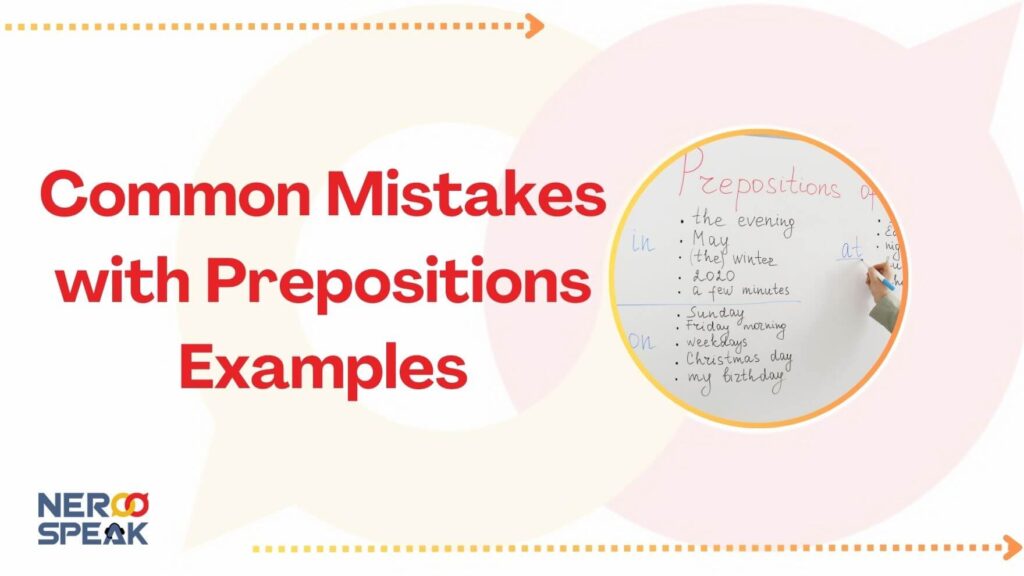
Misusing Prepositions with Time: Common Errors and Corrections
These examples show mistakes people make with prepositions about time. They also provide clear ways to fix these mistakes.
- Using ‘In’ Instead of ‘On’ with Days
- Incorrect: in Monday
- Correct: on Monday
- Using ‘At’ Instead of ‘In’ with Parts of the Day
- Incorrect: at the morning
- Correct: in the morning
- Confusing ‘By’ and ‘Until’ for Deadlines
- Incorrect: Finish this until Friday.
- Correct: Finish this by Friday.
- Incorrect Use of ‘For’ and ‘Since’ with Durations
- Incorrect: I’ve been here since three hours.
- Correct: I’ve been here for three hours.
- Using ‘On’ Instead of ‘In’ with Months
- Incorrect: on June
- Correct: in June
Expand your knowledge today and dive into this article: 100 English Questions and Answers PDF
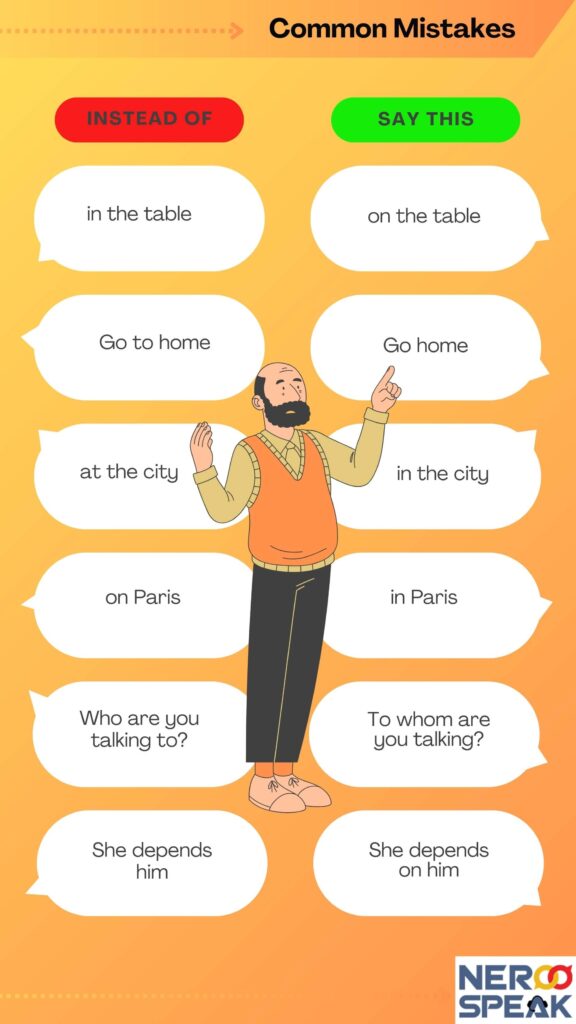
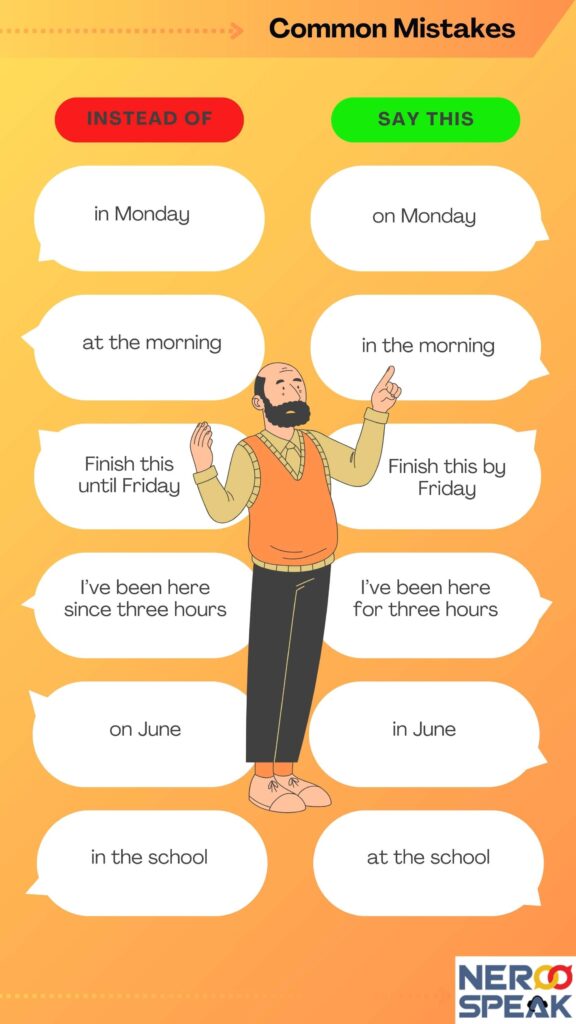
Prepositions Examples: Mistakes in Place Descriptions
These points show common mistakes in using prepositions when describing places. They provide examples to help improve understanding.
- Using ‘In’ Instead of ‘At’ with Specific Locations
- Incorrect: in the school
- Correct: at the school
- Confusing ‘On’ and ‘In’ with Surfaces and Enclosures
- Incorrect: in the table
- Correct: on the table
- Incorrect Use of ‘To’ and ‘At’ with Destinations
- Incorrect: Go to home.
- Correct: Go home.
- Using ‘At’ Instead of ‘In’ for Large Areas
- Incorrect: at the city
- Correct: in the city
- Using ‘On’ Instead of ‘In’ with Cities and Countries
- Incorrect: on Paris
- Correct: in Paris
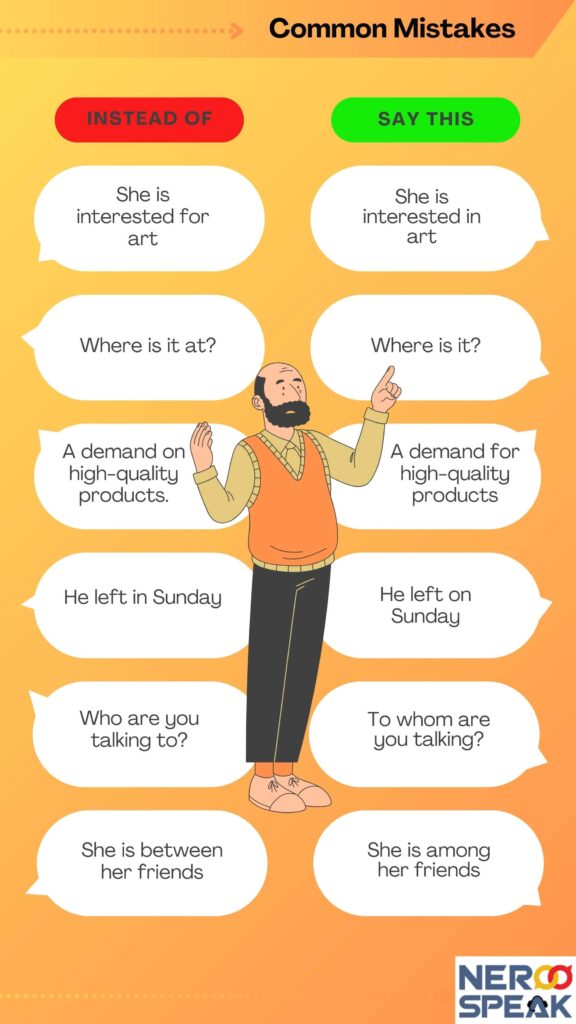
Common Errors with Prepositional Phrases: Examples and Solutions
These points explain common errors with prepositional phrases and provide clear solutions for correct usage:
- Misplacing Prepositions in Questions
- Incorrect:
- Correct: To whom are you talking?
- Incorrect:
- Omitting Prepositions in Verb Phrases
- Incorrect: She depends him.
- Correct: She depends on him.
- Using Wrong Prepositions with Adjectives
- Incorrect: She is interested for art.
- Correct: She is interested in art.
- Redundant Prepositions in Phrases
- Incorrect:
- Correct: Where is it?
- Incorrect:
- Incorrect Prepositions with Nouns
- Incorrect: A demand on high-quality products.
- Correct: A demand for high-quality products.
- Misusing Prepositions with Time
- Incorrect: He left in Sunday.
- Correct: He left on Sunday.
- Incorrect Use of ‘Between’ and ‘Among’
- Incorrect: She is between her friends.
- Correct: She is among her friends.
- Using ‘In’ Instead of ‘At’ for Specific Locations
- Incorrect: in the bus stop.
- Correct: at the bus stop.
- Confusing ‘With’ and ‘By’
- Incorrect: She was hit with a car.
- Correct: She was hit by a car.
- Incorrect Use of ‘For’ and ‘Since’ with Durations
- Incorrect: I’ve been here since three hours.
- Correct: I’ve been here for three hours.
- Using ‘At’ Instead of ‘In’ for Large Areas
- Incorrect: at the city
- Correct: in the city
- Misplacing Prepositions in Passive Constructions
- Incorrect: The book was written from her.
- Correct: The book was written by her.
Incorrect Preposition Pairings with Verbs: Examples and Fixes
- Agree to vs. Agree with
- Incorrect: I agree to his opinion.
- Correct: I agree with his opinion.
- Accuse of vs. Accuse for
- Incorrect: She was accused for theft.
- Correct: She was accused of theft.
- Depend on vs. Depend of
- Incorrect: He depends of his parents.
- Correct: He depends on his parents.
- Consist of vs. Consist in
- Incorrect: The book consists in three parts.
- Correct: The book consists of three parts.
- Blame on vs. Blame for
- Incorrect: They blamed the delay for him.
- Correct: They blamed the delay on him.
- Insist on vs. Insist in
- Incorrect: She insisted in paying.
- Correct: She insisted on paying.
- Apologize for vs. Apologize of
- Incorrect: He apologized of the mistake.
- Correct: He apologized for the mistake.
- Rely on vs. Rely in
- Incorrect: She relies in her friends.
- Correct: She relies on her friends.
- Specialize in vs. Specialize at
- Incorrect: He specializes at cardiology.
- Correct: He specializes in cardiology.
- Confide in vs. Confide to
- Incorrect: She confided to her friend.
- Correct: She confided in her friend.
These examples show common mistakes in word choices with verbs. They also show the correct use to help you speak and write more clearly.
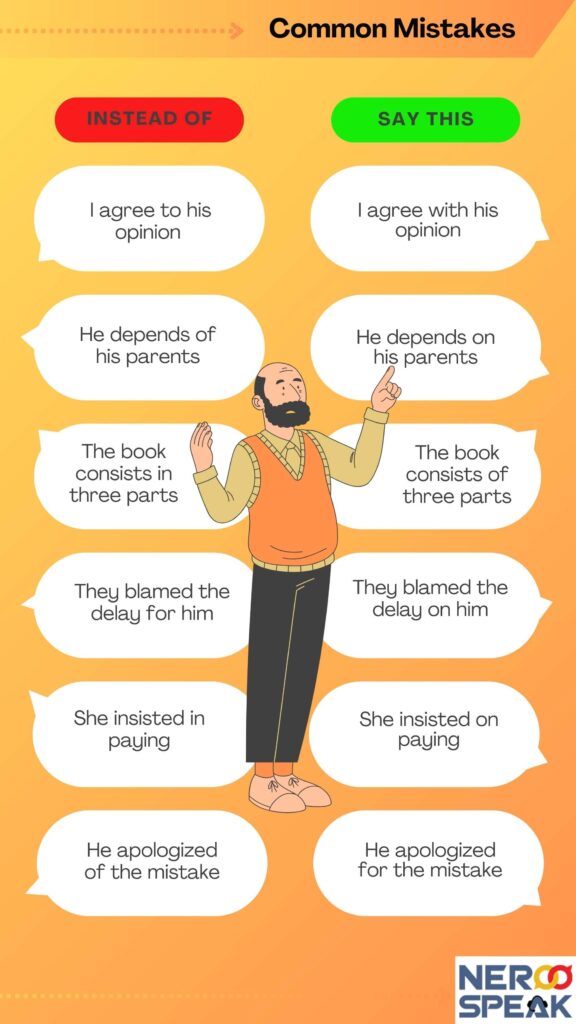
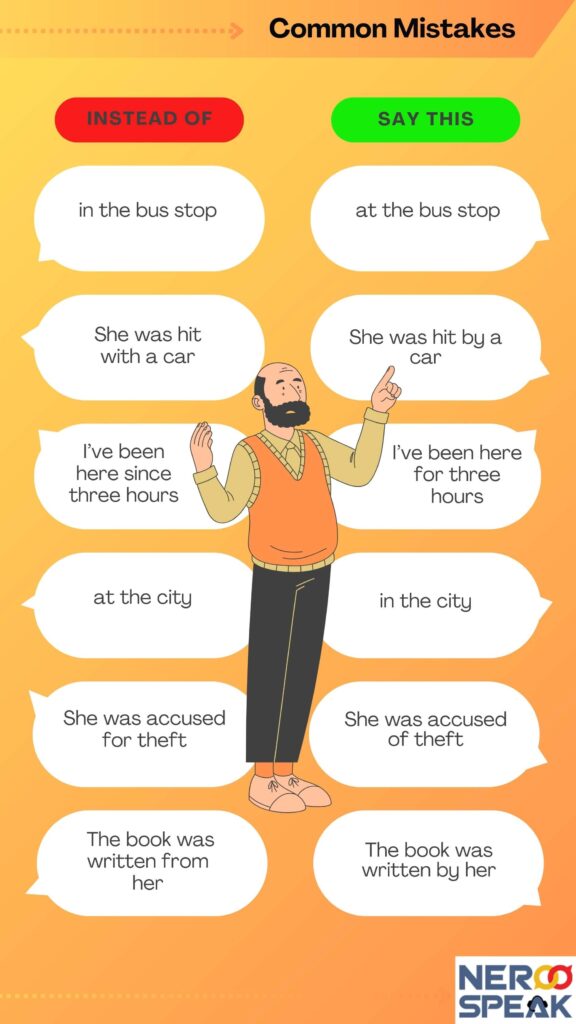
Avoiding Redundant Prepositions: Practical Examples
- Redundant: Where are you at?
- Correct: Where are you?
- Redundant: She’s inside of the house.
- Correct: She’s inside the house.
- Redundant: I’ll meet up with you.
- Correct: I’ll meet you.
- Redundant: He sat down on the chair.
- Correct: He sat on the chair.
- Redundant: We discussed about the issue.
- Correct: We discussed the issue.
- Redundant: She returned back home.
- Correct: She returned home.
- Redundant: He entered into the room.
- Correct: He entered the room.
- Redundant: Let’s plan ahead of time.
- Correct: Let’s plan.
- Redundant: The book fell off of the table.
- Correct: The book fell off the table.
- Redundant: They left out of the building.
- Correct: They left the building.
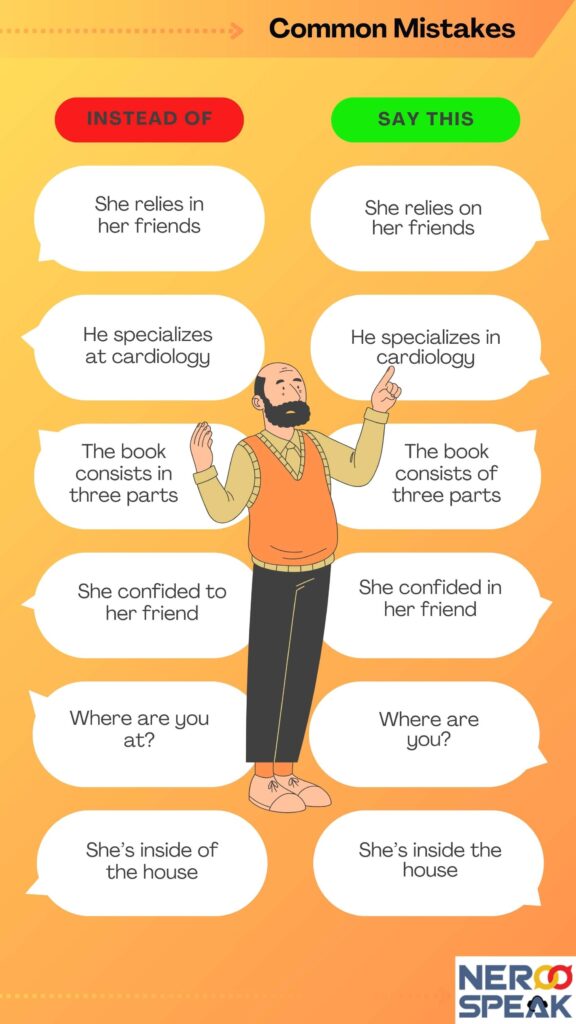
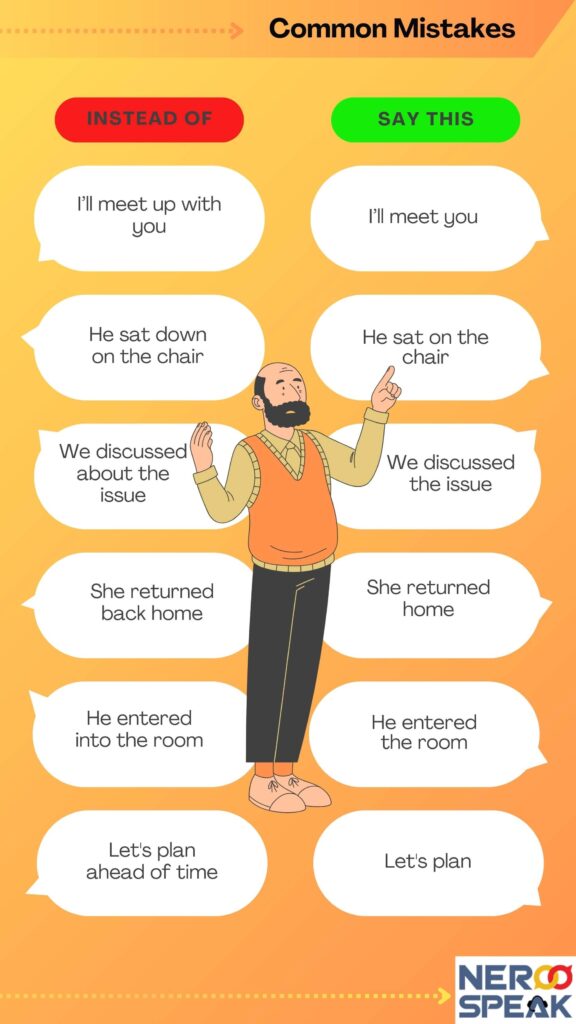
These examples show how to avoid extra prepositions. This will help make your language clearer and easier.
We hope you had a good read!!
Important FAQs:
1- What are the common mistakes in prepositions?
- Using the wrong preposition (e.g., interested on instead of interested in).
- Omitting necessary prepositions (e.g., good example instead of a good example of).
- Adding unnecessary prepositions (e.g., where are you at? instead of where are you?).
2- What are grammatical errors involving prepositions?
- Incorrect combinations (e.g., different than instead of different from in formal writing).
- Confusion in phrasal verbs (e.g., look at versus look for).
- Misplacement of prepositions in questions (e.g., What did you talk about? versus About what did you talk?).
3- What are the most commonly misused prepositions?
- In vs. on (e.g., on the bus vs. in the car).
- At vs. to (e.g., arrive at vs. go to).
- For vs. since (e.g., waiting for hours vs. since this morning).
4- What are the problems with prepositions?
- Idiomatic usage: Many prepositions are used idiomatically, making them hard to predict (e.g., rely on, good at).
- Language interference: Learners may transfer rules from their native language.
- Context-dependent meanings: Prepositions change meaning based on context (e.g., on time vs. in time).
Finally, we are here to help you learn the English language in perfect ways. Read more now!
- Building Shapes Names
- All Names and Pictures of Shapes
- +40 of Water Idioms with Meaning
- Uncountable Nouns List
- All Emotions List

Ali Mohammad is a SEO Specialist, Content Writer, and WEB Developer with over 4 years of experience in WEB. He has a strong background in Content Writing gained through SEO Companies. He holds a Master Degree in Communications Engineering from Tishreen University and is a certified professional. Ali is passionate about Business and Engineering and enjoys helping readers by sharing his knowledge.